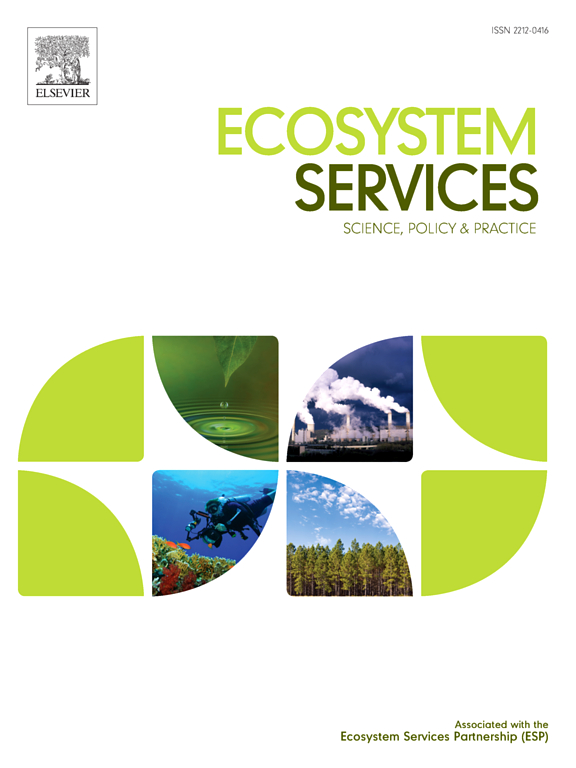论离散选择实验框架对推导生态系统和物种增值服务会计价值的重要性
IF 6.6
2区 环境科学与生态学
Q1 ECOLOGY
引用次数: 0
摘要
发展货币生态系统核算需要对交换价值进行估计。虽然联合国环境经济核算系统-生态系统核算(SEEA - EA)框架目前不认为非使用服务的流量(例如,仅仅从一个物种的存在中获得的价值)是生态系统服务,但它们可以记录为生态系统和物种增值服务。估计这些服务的交换价值依赖于非市场估价方法。可以说,最适合这个目的的方法是离散选择实验(DCE)。将从DCE获得的边际价值转换为交换价值可能很复杂,并且存在一系列潜在的缺陷。在本文中,我们提出了一种方法,允许将边际支付意愿(WTP)估计转换为ESA服务的交换价值,用于DCE估值问题的代表性框架集。我们通过澳大利亚物种和生态系统的案例研究,展示了这种方法的适用性,代表了选择属性的恒定和非恒定WTP估计。这是估算欧空局服务交换价值的一种相对灵活的方法。本文章由计算机程序翻译,如有差异,请以英文原文为准。
On the importance of discrete choice experiment framings to derive accounting values for ecosystem and species appreciation services
Developing monetary ecosystem accounts requires the estimation of exchange values. While flows of non-use services (e.g., the value derived from the mere existence of a species) are currently not considered as ecosystem services by the United Nations System of Environmental Economic Accounting – Ecosystem Accounts (SEEA – EA) framework, they may be recorded as Ecosystem and Species Appreciation (ESA) services. Estimating exchange values for these services relies on non-market valuation methods. Arguably the most suitable method for this purpose is a Discrete Choice Experiment (DCE). Transforming marginal values obtained from a DCE into exchange values can be complex and presents a range of potential pitfalls. In this paper, we present an approach that allows translating marginal Willingness-To-Pay (WTP) estimates into exchange values for ESA services for representative sets of framings of the DCE valuation question. We show the applicability of this approach using case studies of Australian species and ecosystems, representing both constant and non-constant WTP estimates for choice attributes. It is a relatively flexible approach for estimating exchange values for ESA services.
求助全文
通过发布文献求助,成功后即可免费获取论文全文。
去求助
来源期刊

Ecosystem Services
ECOLOGYENVIRONMENTAL SCIENCES&-ENVIRONMENTAL SCIENCES
CiteScore
14.90
自引率
7.90%
发文量
109
期刊介绍:
Ecosystem Services is an international, interdisciplinary journal that is associated with the Ecosystem Services Partnership (ESP). The journal is dedicated to exploring the science, policy, and practice related to ecosystem services, which are the various ways in which ecosystems contribute to human well-being, both directly and indirectly.
Ecosystem Services contributes to the broader goal of ensuring that the benefits of ecosystems are recognized, valued, and sustainably managed for the well-being of current and future generations. The journal serves as a platform for scholars, practitioners, policymakers, and other stakeholders to share their findings and insights, fostering collaboration and innovation in the field of ecosystem services.
 求助内容:
求助内容: 应助结果提醒方式:
应助结果提醒方式:


